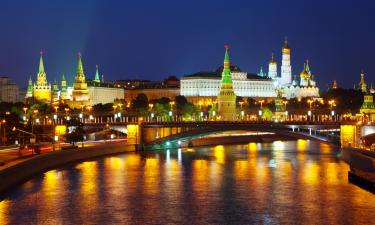Drew Curtis of Fark.com: Real News does not bring eyeballs
Pravda.ru interviewed Drew Curtis, the man behind the world-known blog Fark.com, about the secrets of news presentation. It is an open secret that many news sites have to use a variety of techniques to increase their traffic and to stay alive on the Internet. It just so happens that people surfing for news on the net are mostly attracted to catchy headlines and outrageous content. Serious analytical articles are often left without attention. Here is what Drew Curtis has to say on the matter.
1. You complain of the fact that even most respectable media outlets may often give more priority to news reports and photos of tattooed fish and push serious political analytical articles into the background. However, what can you do if you know in advance that tattooed fish will attract much more attention than an article about Iraq?
That is the crux of the problem: stories about tattooed fish actually do draw more interest than serious articles. Real news doesn't bring eyeballs and traffic, outrageous articles do. My issue is that if you are going to call yourself a 'news leader', you have to then lead with real news stories. Some news organizations don't claim to be anything of the sort. Take The Sun in London, for example. Nowhere does The Sun claim to be a 'news leader' or even a major source for real news. They've given up all pretense. This doesn't mean they don't run real news from time to time, but they don't have staff in major cities across the planet doing real-time reporting like, for example, CNN does. My point is, you can't be a 'news leader' and run stories about tattooed fish, either you stick solely to real news or just throw it all out the window and become a tabloid. And I'm not saying this because I feel like this is some natural order that the universe must return to, I'm saying this because when a major news outlet peppers real news with an inordinate amount of crap stories, they're not being 'news leaders' and they're also being really bad tabloids as well. They do neither thing well. There is a place in the world for both types of mass media, news organizations need to choose which one they will be. Trying to do both at the same time results in mediocrity and a frustrated media consumer.
2. A headline may often differ from what an article actually says. What should those working for news sites do because a very interesting news story will be left unnoticed if it has no attention-catching headline.
This is correct, I agree completely. However given that the only thing we do on Fark is write catchier headlines, I am of the opinion that attention-catching headlines can be done without contradicting article content. I feel it is disingenuous to mislead on purpose, mainly because few people actually do read article content. They generally just take in the headlines and move on. So an article with the headline 'Was There an Ancient Civilization in Southwest Florida?' leads people who only read headlines to believe that there might be some scientific evidence that there actually was an ancient civilization in Florida, when in reality there is not. That is a real article by the way, the Tampa Bay Tribune printed an article about exactly that subject. Some will probably argue that perhaps people should pay more attention and read more critically, but in the real world, people not only don't do this, but they never have and never will.
There's a running joke here in the US that you can get away with any headline as long as you put a question mark at the end of it. As long as you're not making a false statement you're fine as far as libel problems go. You can make a false question in the form of a headline all you want and you're protected. Are aliens our ancestors? Did a spaceship crash in Texas in 1897? Can we produce electricity from beets? Sadly, these are all real examples as well.
3. Taking this background into consideration, do you think that articles with profound analytical insight have a chance to survive on the Internet?
They do have a chance to survive, however what is going to change is the number of people who passively consume them. What I mean by passive consumption relates to how media is consumed in general. Before the internet, if you bought Time Magazine because there was a good sports article in there, you by default technically consumed all of the rest of the magazine's content (along with all of the advertisements, as far as the magazine's marketing department was concerned). Now that we have the internet, media consumption is done a la carte, on a story by story basis. I suspect that analytical articles never were closely paid attention to in the first place by consumers, we just couldn't tell because they had to buy the entire magazine or newspaper and couldn't do what they do now which is pick and choose what they are going to read.
So the problem we now have is should a lot of attention be paid to these types of articles when few people care to read them? The answer is yes. This is where the blogosphere came from. Weblogs rose to fill a void in niche-market reporting that mass media was underserving. Had mass media been doing a good enough job in the first place, blogs wouldn't have been able to find an audience.
However is it also the case that in-depth analysis is probably not going to be the most profitable way of running a media outlet? Unfortunately, yes. It costs the most to produce and appeals to the fewest number of people.
Here's the kicker though: when real news actually does happen, it draws an audience far in excess of what not-news can bring. When terrorists attack, when political intrigue thickens, when wars start and so on, real news sites get slammed with far more traffic than in many cases they're prepared to handle. I don't know if you remember this but on 9/11/2001 nearly every major media website on the entire planet crashed because of too much traffic. When has that ever happened for Britney Spears, UFOs, or scary predictions of asteroids killing us all 30 years from now? Never. So technically speaking real news should be commercially viable, just in short bursts separated by long periods of not much going on.
What mass media should do is create a separate brand for their not-news. Pravda.ru appears to have already done this. Anything outrageous and definitely not news goes to funreports.ru . Anything that is actual news remains at Pravda.ru . Thus, people read pravda.ru expecting to be informed, and people read funreports.ru expecting to be entertained. All the ad revenue flows into the same bank account.
Amusingly as I am writing this I just got a BREAKING NEWS ALERT from CNN that a guy who won the lottery last night says he's "goin' fishing". Breaking news eh?
4. There are many news stories that are made of pieces of news taken from other sources with a particular goal. What place should they have among all other news?
I suspect this kind of thing has been going on since the advent of print media. I can't prove it but I'm willing to bet that in the 19th century, most small town newspapers on what was then the western frontier of the US were probably just regurgitated versions of month-old copies of the New York Times. All the major US news outlets do the same thing. If you sit in the control room of Fox or CNN in New York, you'll notice that they have one TV screen for every single news network and they're monitoring all of them. If someone breaks news, they immediately release their own version entirely based on what the first news outlet said. Believe it or not, lately I've actually seen CNN backing off of this practice. As a friend of mine over there once told me, the days of the exclusive breaking news story are over.
All too often I see this kind of thing used as a dodge by the news media to cover their sloppy journalism. Rather than check to see if a story is true or not, they just copy the article (not word for word but by rewriting the good content) and then stick on the following disclaimer: " So-and-so.com reports blah blah blah." They do this because that way they are protected if the information is wrong, but it's being relied on too much as an excuse not to do any fact checking in the first place. Is it a good thing? Probably not. Has it ever been any different? I doubt it.
5. Do you think a subjective or unconfirmed commentary should be considered a hoax, or does it have a right for existence?
In the context of op-ed pieces, it does have a place but it has to be properly labelled and mass media needs to use some discretion. Some people are complete nutjobs and don't deserve a platform. I know that people are going to respond that you can't know all the time whether or not someone's viewpoint is valid. I agree that this is the case, however some of the time you absolutely DO know that a person's viewpoint is complete crap. Don't give these people the ability to reach a larger audience.
In the context of breaking news, oftentimes there is no way to check everything as events unfold. However what I would like to see would be less copycatting of vague details by multiple media outlets. I call this phenomenon the Mysterious Repeating Source. It happens when media outlets copy details off each other but no one checks to see if it's a real detail. As a result, people will see multiple news outlets reporting something and automatically assume it must be true since it's coming from more than one source. In reality they're just repeating each other.
Honestly there's probably no way to do this kind of thing right. It's the curse of media during breaking events to have to fill blank spaces with something, anything. No one is going to watch news on TV or the Internet if they're not able to deliver any details.
Drew Curtis
Fark.com: It's not news, It's Fark
Subscribe to Pravda.Ru Telegram channel, Facebook, RSS!





